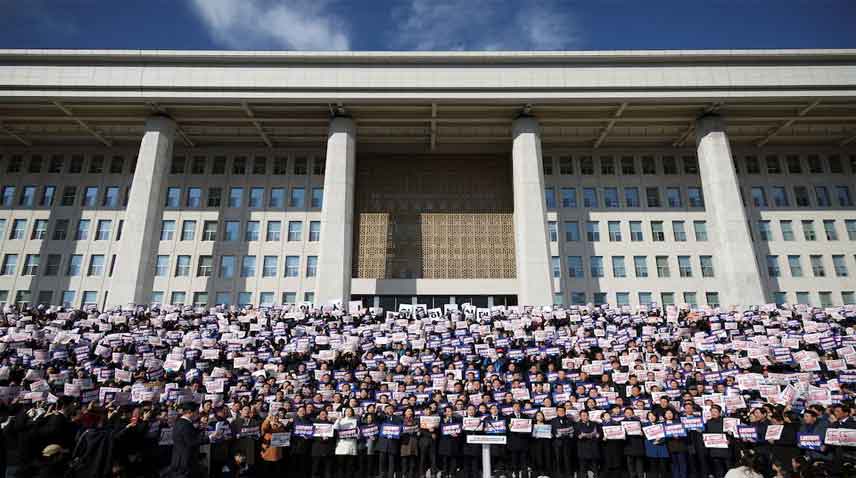
It has triggered a political crisis in Asia s fourth-largest economy.
The surprise declaration ignited a standoff with parliament which rejected his attempt to ban political activity and censor the media, as armed troops forced their way into the National Assembly building in Seoul.
The main opposition Democratic Party called for Yoon, who has been in office since 2022, to resign or face impeachment.
“It was clearly revealed to the entire nation that President Yoon could no longer run the country normally. He should step down," senior DP member of parliament Park Chan-dae said in a statement.
The leader of Yoon s ruling People Power Party called for Defence Minister Kim Yong-hyun to be fired and the entire cabinet to resign.
Yoon told the nation in a TV address late on Tuesday that martial law was needed to defend the country from nuclear-armed North Korea and pro-North anti-state forces, and protect its free constitutional order, although he cited no specific threats.
Chaotic scenes ensued as troops tried to seize control of the parliament building, parliamentary aides sprayed fire extinguishers to push them back, and protesters scuffled with police outside.
The military said activities by parliament and political parties would be banned, and that media and publishers would be under the control of the martial law command.
But lawmakers defied the security cordon and within hours of the declaration, South Korea s parliament, with 190 of its 300 members present, unanimously passed a motion requiring martial law be lifted, including all 18 members present from Yoon s party. The president then rescinded the declaration.
Protesters outside the National Assembly shouted and clapped. “We won!” they chanted, and one demonstrator banged on a drum.
"There are opinions that it was too much to go to emergency martial law, and that we did not follow the procedures for emergency martial law, but it was done strictly within the constitutional framework," a South Korean presidential official told Reuters by phone.
The U.S. embassy urged U.S. citizens in South Korea to avoid areas where protests were taking place.
Financial markets were volatile with South Korean stocks (.KS11), allowing around 2 percent and the won steadying after plunging to a two-year low. Dealers reported suspected intervention by South Korean authorities to stem the won s slide.
"We will inject unlimited liquidity into stocks, bonds, short-term money market as well as forex market for the time being until they are fully normalised," the government said in a statement.
DODGED A BULLET
A major South Korean convenience store chain, which declined to be identified, said sales of canned goods, instant noodles and bottled water had soared overnight.
"I m deeply disturbed by this kind of situation, and I m very concerned about the future of the country," 39-year-old Seoul resident Kim Byeong-In told Reuters.
The National Assembly can impeach the president if more than two-thirds of lawmakers vote for it. A trial is then held by the constitutional court, which can confirm it with a vote by six of the nine justices.
Yoon’s party controls 108 seats in the 300-member legislature.
If Yoon resigned or was removed from office, Prime Minister Han Duck-soo would fill in as leader until a new election was held within 60 days.
"South Korea as a nation dodged a bullet, but President Yoon may have shot himself in the foot," Danny Russel, vice president of the Asia Society Policy Institute think tank in the United States, said of the first martial law declaration in South Korea since 1980.
U.S. Secretary of State Antony Blinken said he welcomed Yoon s decision to rescind the martial law declaration.
"We continue to expect political disagreements to be resolved peacefully and in accordance with the rule of law," Blinken said in a statement.
South Korea hosts around 28,500 American troops as a legacy of the 1950-1953 Korean War.
Planned defence talks and a joint military exercise between the two allies were postponed amid the broader diplomatic fallout from the overnight turmoil.




